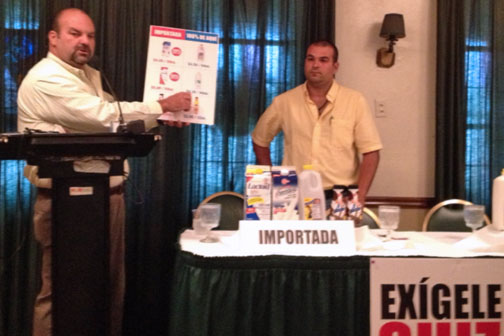Farmers: Imported milk products 50% more expensive


Puerto Rico Farm Bureau President Ramón González (at podium) shows the price difference resulting from buying products based on imported milk.
Members of the Puerto Rico Farm Bureau continued their campaign to press consumers to learn about the origin of the milk used in the dairy products they buy and make sure they are manufactured using local milk, saying they will save as much as 50 percent in doing so. The group also continued pressuring dairy producer Suiza Dairy to support the local milk sector by substituting imports.
“All fresh milk sold in Puerto Rico is locally produced milk. In the production of dairy by-products, Suiza Dairy is using imported milk, importing about 10 million pints a year. These products made with imported milk are more expensive than those made by Tres Monjitas using local milk,” Farm Bureau President Ramón González said during a morning news conference in Hato Rey.
To illustrate his point, Gonzalez presented certain products that Suiza Dairy makes with imported milk and showed the difference in cost between their products and similar products made from local milk.
Among Suiza’s products made with imported milk is the “Milk to Go” chocolate drink, which sells for $2.99, competing with Tres Monjitas’ chocolate drink, made with local milk and that sells for $2.55. Meanwhile, Suiza’s Lactaid lactose-free milk goes for $5.99, competing against Tres Monjitas’ Lactiva milk at $4.35; Suiza’s Essential low-fat milk, high protein product sells for $4.49 vs. Tres Monjitas’ Essential milk, at $3.50.
“The price difference in Suiza’s imported products ranges from 17 percent to 47 percent more expensive than Tres Monjitas products made with local milk. We want to know, how is it that for Tres Monjitas it is good business to manufacture their products with local milk, while Suiza prefers to import them here?,” González questioned. “That is lacking a commitment to this island’s agriculture whom we represent, “said Gonzalez, during the second round of public complaints by farmers on this subject.
The first event took place last week with a demonstration in front of Suiza Dairy’s headquarters.
Attempts to obtain a reaction from Suiza Dairy representatives were unsuccessful Monday.

During the first two months of this year, Suiza Dairy has reportedly already imported 435,161 quarts of chocolate milk, 14,864 quarts of lactose-free milk and 14,385 quarts of Essential milk.
Millions of quarts imported
Puerto Rico produces about 275 million quarts of milk per year of which 225 million are sold as fresh milk. The surplus is used to process ultra-high temperature milk through Industrias Lecheras de Puerto Rico, known as Indulac. That production is sold under private labels and exported.
At present Suiza Dairy commands 62 percent of Puerto Rico’s fresh milk market and a wide distribution network throughout the island.
According to the Milk Industry Regulatory office, in 2012, the company imported 325,000 quarts of chocolate milk, 2.1 million quarts of Nesquik (a chocolate drink made with reconstituted powdered milk), and 1.1 million quarts of Essential high-protein milk. During the first two months of this year, Suiza Dairy has reportedly already imported 435,161 quarts of chocolate milk, 14,864 quarts of lactose-free milk and 14,385 quarts of Essential milk for a total of 7.9 million quarts of milk, the farmers said during the meeting with reporters.
“During certain seasons, we can have a surplus that forces us to dump 8 million quarts of milk that we could be selling to Suiza for their products such as chocolate milk, yogurt, high-fat milk and lactose-free milk. That would help to strengthen the agricultural sector at a time when we talk about the global food crisis and the importance of self-sufficiency in basic supplies.”
For his part, Juan Carlos Rivera, head of the Bureau’s milk industry sector, said farmers aren’t “against Suiza” and “want it to grow and grow with it.”
“However, for that to happen they have to support local production. They have the opportunity to do that by eliminating milk imports and use fresh local milk in the manufacture of their products,” said Rivera.
The trade group also urged Suiza Dairy to expand distributions routes to central island towns.







